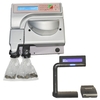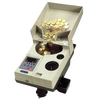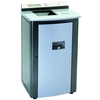About us
SELEX was founded in December 1959 in order to apply the inventions and projects of its founder, Mr. Giacomo Picollo.
His studies of these projects were undertaken in 1955 when he built the first prototype of a coin sorting machine (Below you can see one of the first prototype of a coin sorting machine). The first customer of SELEX was an important bank, the Cassa di Risparmio di Verona, Vicenza e Belluno, that bought 5 machines.
This sale provided a strong incentive and moral support for pursuit of the project. The company opened its first plant in Capriata D'Orba n.26, via Stazione. The invention was registered in Italy in 1966 and was also issued a prestigious U.S. patent in 1968. COIN SORTING MACHINE In the meantime, the company had begun to export this model and in 1962 it started a close collaboration with a German company for sales of the products in northern Europe. Early in seventies, while continuing its constant research into technological improvements, the company began to design a coin counting/sorting machine of reduces size that was called SELECTA ( see its photo).
In 1972, it was time to complete the range of coin handling machines with a coin wrapping machine. The first model of this machine was called ROTORAPID ( see photo) and it was patented in Spain, France and great Britain. The machine went throught various stages of development and improvement, under the names of FUTURA 2000, ROTORAPID JR, OMNIA up to the current models, MINI OMNIA and SIRIO 30.
From then on, at the end of the eighties and up to the present time, the company has continued to grow and consolidate its image worldwide. ROTORAPID It now has two branches, one in Barcelona (Spain) and the other in Nice (France), and exports its products everywhere in the world (Mexico, Columbia, Brazil, Hungary, Poland, Senegal, Arabian Countries, etc...).
We are therefore convinced that the main reason for the success of SELEX lies in the strict commitment to the highest quality and reliability of the products, as well as in the originality of the invention.
 International Partner |
International Partner | 


